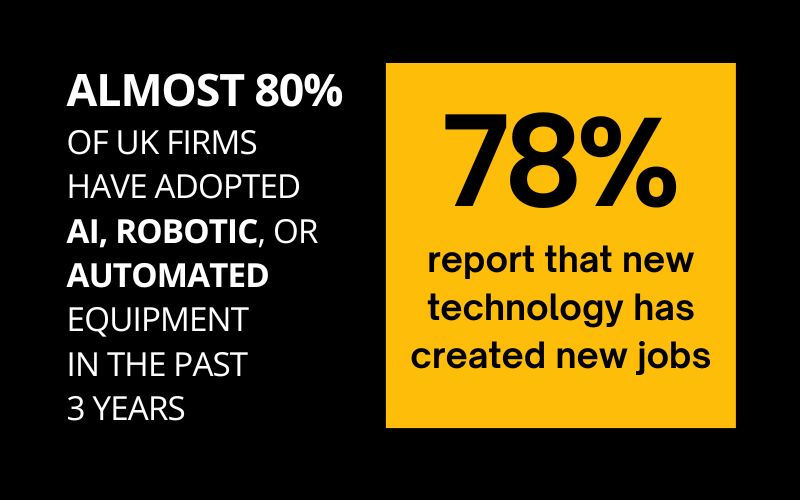Lately, we’ve been hearing a lot about AI and robots potentially replacing humans at work. While most of the discussion revolves around how AI affects employment, there hasn’t been much research. Creating and using these technologies can affect the quality of jobs, the need for specific skills, and the possibility of generating new jobs. A survey was conducted in the UK recently to learn more about how businesses have been adopting AI and how business leaders think it will impact on employment.
Survey of UK Businesses and the Future of Work
This summary presents the results of a survey conducted in September 2023 with over 1,000 companies in the UK. The goal was to understand what factors influence the adoption of AI. The survey also provided some insight into how AI technologies might impact employment.
This survey is part of the Pissarides Review on the Future of Work and Wellbeing, funded by the Nuffield Foundation. The Nuffield Foundation is an independent charitable trust with a mission to advance social wellbeing. It funds research that informs social policy, primarily in education, welfare, and justice.
Survey respondents were senior executives including CEOs, COOs, CTOs, CHROs from firms with more than 20 employees across various industries. These executives were responsible for adopting new technologies and human resource practices.
The survey findings indicate that while we are at a crucial point in the adoption of this technology, the ultimate impact is still uncertain.
The full study is available at this link: https://global-uploads.webflow.com/64d5f73a7fc5e8a240310c4d/650a128a34386a1206b6506c_FINAL%20Briefing%20-%20Adoption%20of%20Automation%20and%20AI%20in%20the%20UK.pdf
Survey Key Findings
The vast majority of those polled had tried and adopted AI technology, robotics, or automation into their business practices. The impact on employment was mixed. While jobs in some areas were eliminated, other areas saw the creation of new jobs.
In the sample of 1012 respondents, almost 80% of UK firms have adopted AI,
robotic or automated equipment in the past three years, with a similar proportion for physical or cognitive tasks.
Of the 864 organizations that have adopted at least one of the new technologies:
78% report that new technology has created new jobs
55.3% report that new technology has eliminated or replaced jobs

Additionally, in the past three years:
79% of firms report adopting new technology to undertake a non-physical / cognitive task.
For those firms reporting that they have adopted these technologies:
– the net impact on job creation is positive.
– the net impact on skills is positive.
Going into greater depth on the question of what influences AI adoption, and the impacts on jobs and job quality, the study demonstrates that:
– variations in innovation readiness across UK regions significantly alter the relationship between technology adoption and work outcomes
– high levels of readiness are associated with more positive outcomes.
Implied Community Action Needed
The study suggests that swift action is needed because the use of automation is spreading quickly across businesses of all sizes, and the impact to employment is mixed. Governments, employers, and employees all need to be aware of the potential impacts on worker equality. Some may miss out on the opportunities that automation offers.
Promoting “Good Automation”
The study goes on to suggest that in order to achieve the best outcomes, there should be a renewed focus on “good automation.” Therefore creating an environment where good work can thrive.
Employers and Employees should embrace a Human Resource Management (HRM) approach with high-involvement practices. This will help develop a positive attitude towards technology adoption and the potential benefits of AI. This, in turn, can result in a wider range of work outcomes, including the creation of new jobs, the enhancement of human skills, and an improvement in the quality of work.
HIVE Tax AI Assistants Improve Work for CPAs
As we’ve explored in this article, AI is changing the way we work, and the HIVE Tax AI Assistants are at the forefront of this transformation. These powerful tools are not just about automation; they’re about improving the quality of work done by tax professionals.
In a profession where precision and efficiency are paramount, our AI-powered assistants can be your trusted ally. It streamlines processes, reduces errors, and ensures that you can provide your clients with top-tier service. It’s not just a chatbot; it’s a 24/7 support system that’s always ready to assist you.
Don’t hesitate to take your CPA practice to the next level. Try these AI-powered tools developed specifically for your business. It’s time to take that leap and elevate your practice with HIVE Tax AI Assistants. Your clients will thank you, and your business will thrive.
